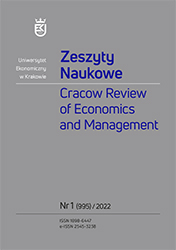The Relationships between Social Security Funds and Macroeconomic Changes. An Empirical Analysis of the EU-CEE Countries
DOI:
https://doi.org/10.15678/ZNUEK.2022.0995.0101Słowa kluczowe:
zabezpieczenie społeczne, wzrost, bezrobocie, inflacja, przyczynowość w sensie GrangeraAbstrakt
Tytuł artykułu: Zależności między funduszami zabezpieczenia społecznego a zmianami makroekonomicznymi. Analiza empiryczna dla państw Europy Środkowo-Wschodniej należących do Unii Europejskiej
Cel: Ustalenie, czy i które zmienne makroekonomiczne mogą być przyczyną w sensie Grangera zmian finansów sektora ubezpieczeń społecznych i odwrotnie.
Metodyka badań: Zastosowano narzędzia statystyki opisowej, bootstrapowy test przyczynowości w sensie Grangera dla danych panelowych, test Pesarana CD na występowanie zależności przekrojowej w danych panelowych i test Pesarana CIPS pierwiastka jednostkowego dla danych panelowych. Wykorzystano dane panelowe dotyczące państw Europy Środkowo-Wschodniej, które są członkami Unii Europejskiej. Badania obejmują lata 2000–2019.
Wyniki badań: Z przeprowadzonych badań wynika, że opóźnione wartości wskaźników makroekonomicznych mogą poprawić prognozę wydatków sektora ubezpieczeń społecznych, a uwzględnienie jego wydatków może przyczynić się do lepszego prognozowania rozważanych wskaźników makroekonomicznych.
Wnioski: Utrzymanie stabilnego wzrostu gospodarczego może pozytywnie wpłynąć na stabilność finansową sektora ubezpieczeń społecznych.
Wkład w rozwój dyscypliny: Proponowana koncepcja badań jest pierwszą, która odnosi się do finansów sektora ubezpieczeń społecznych. W badaniu uwzględniono główne elementy systemów zabezpieczenia społecznego, wiążąc je z najważniejszymi wskaźnikami makroekonomicznymi.
Downloads
Bibliografia
Afonso A., Rault C. (2009), Bootstrap Panel Granger-causality between Government Spending and Revenue in the EU, William Davidson Institute Working Paper no. 944, http://dx.doi.org/10.2139/ssrn.1488334.
Auerbach A. J., Gale W. G., Harris B. H. (2010), Activist Fiscal Policy, “The Journal of Economic Perspectives”, vol. 24(4), available at https://pubs.aeaweb.org/doi/pdfplus/10.1257/jep.24.4.141 (accessed: 5.05.2020).
Bellettini G., Ceroni C. B. (1999), Is Social Security Really Bad for Growth?, “Review of Economic Dynamics”, vol. 2(4), https://doi.org/10.1006/redy.1998.0050.
Bhattarai K. (2016), Unemployment–inflation Trade-offs in OECD Countries, “Economic Modelling”, vol. 58, https://doi.org/10.1016/j.econmod.2016.05.007.
Bruno M., Easterly W. (1998), Inflation Crises and Long-run Growth, “Journal of Monetary Economics”, vol. 41(1), https://doi.org/10.1016/S0304-3932(97)00063-9.
Cahuc P., Zylberberg A. (2004), Labor Economics, MIT Press Books, Cambridge.
Cammeraat E. (2020), The Relationship between Different Social Expenditure Schemes and Poverty, Inequality and Economic Growth, “International Social Security Review”, vol. 73(2), https://doi.org/10.1111/issr.12236.
Cloyne J. (2013), Discretionary Tax Changes and the Macroeconomy: New Narrative Evidence from the United Kingdom, “American Economic Review”, vol. 103(4), https://doi.org/10.1257/aer.103.4.1507.
Connolly M., Li C. (2016), Government Spending and Economic Growth in the OECD Countries, “Journal of Economic Policy Reform”, vol. 19(4), https://doi.org/10.1080/17487870.2016.1213168.
Croissant Y., Millo G. (2008), Panel Data Econometrics in R: The plm Package, “Journal of Statistical Software”, vol. 27(2), https://doi.org/10.18637/jss.v027.i02.
Cuaresma J. C. (2003), Okun’s Law Revisited, “Oxford Bulletin of Economics and Statistics”, vol. 65(4), https://doi.org/10.1111/1468-0084.t01-1-00056.
Dumitrescu E.-I., Hurlin C. (2012), Testing for Granger Non-causality in Heterogeneous Panels, “Economic Modelling”, vol. 29(4), https://doi.org/10.1016/j.econmod.2012.02.014.
Esping-Andersen G. (1999), Social Foundations of Postindustrial Economies, Oxford University Press, New York.
Gechert S. (2015), What Fiscal Policy Is Most Effective? A Meta-regression Analysis, “Oxford Economic Papers”, vol. 67(3), https://doi.org/10.1093/oep/gpv027.
Gechert S., Paetz C., Villanueva P. (2021), The Macroeconomic Effects of Social Security Contributions and Benefits, “Journal of Monetary Economics”, vol. 117(C), https://doi.org/10.1016/j.jmoneco.2020.03.012.
Keynes J. M. (1936), The General Theory of Employment, Interest and Money, Macmillan and Co, London.
Lambrecht S., Michel P., Vidal J.-P. (2005), Public Pensions and Growth, “European Economic Review”, vol. 49(5), https://doi.org/10.1016/j.euroecorev.2003.09.009.
Lindert P. H. (2004a), Growing Public. Social Spending and Economic Growth since the Eighteenth Century, vol. 1, Cambridge University Press, New York.
Lindert P. H. (2004b), Growing Public. Social Spending and Economic Growth since the Eighteenth Century, vol. 2, Cambridge University Press, New York.
Lopez L., Weber S. (2017), Testing for Granger Causality in Panel Data, IRENE Working Papers no. 17-03.
Manage N., Marlow M. L. (1986), The Causal Relation between Federal Expenditures and Receipts, “Southern Economic Journal”, vol. 52(3), https://doi.org/10.2307/1059261.
Mankiw N. G., Taylor M. P. (2014), Macroeconomics. European Edition, 2nd ed., W.H. Freeman, New York.
Mineshima A., Poplawski-Ribeiro M., Weber A. (2014), Size of Fiscal Multipliers (in:) Post-Crisis Fiscal Policy, C. Cottarelli, P. Gerson, A. Senhadji (eds), MIT Press, Cambridge.
Musgrave R. A., Musgrave P. B. (1989), Public Finance in Theory and Practice, McGraw-Hill, New York.
Peacock A., Scott A. (2000), The Curious Attraction of Wagner’s Law, “Public Choice”, vol. 102(1–2), https://doi.org/10.1023/A:1005032817804.
Pesaran M. H. (2004), General Diagnostic Tests for Cross Section Dependence in Panels, CESifo Working Paper no. 1229.
Pesaran M. H. (2007), A Simple Panel Unit Root Test in the Presence of Cross-section Dependence, “Journal of Applied Econometrics”, vol. 22(2), https://doi.org/10.1002/jae.951.
Samudram M., Nair M., Vaithilingam S. (2009), Keynes and Wagner on Government Expenditures and Economic Development: the Case of a Developing Economy, “Empirical Economics”, vol. 36, https://doi.org/10.1007/s00181-008-0214-1.
Smith A. (1812), An Inquiry into the Nature and Causes of the Wealth of Nations, vol. 3, Printed for Cadell and Davies, London.
Tanzi V. (2015), Hayek and the Economic Role of the State: Some Comparison with Keynes’ Views (in:) Europe, Switzerland and the Future of Freedom. Essays in Honour of Tito Tettamanti, K. Hummler, A. Mingardi (eds), IBL Libri, Torino.
Zagler M. (2004), On the Causality between Economic Growth and Unemployment (in:) Growth and Employment in Europe, Palgrave Macmillan, London, https://doi.org/10.1057/9780230506329_8.
Zhang J., Zhang J. (2014), How Does Social Security Affect Economic Growth? Evidence from Cross-Country Data, “Journal of Population Economics”, vol. 17(3), https://doi.org/10.1007/s00148-004-0198-x.




